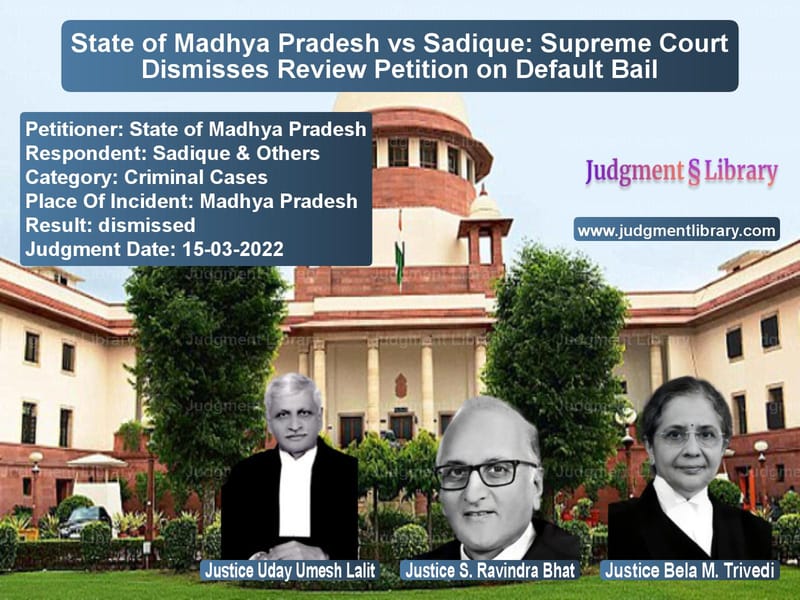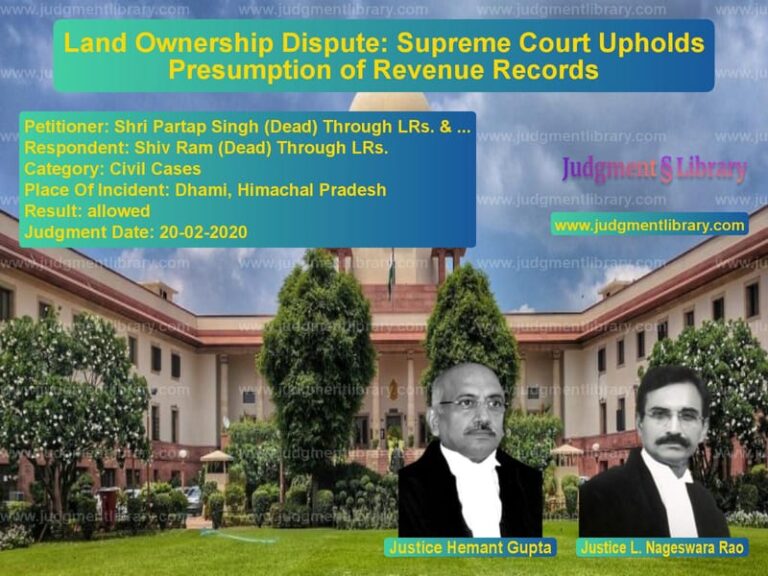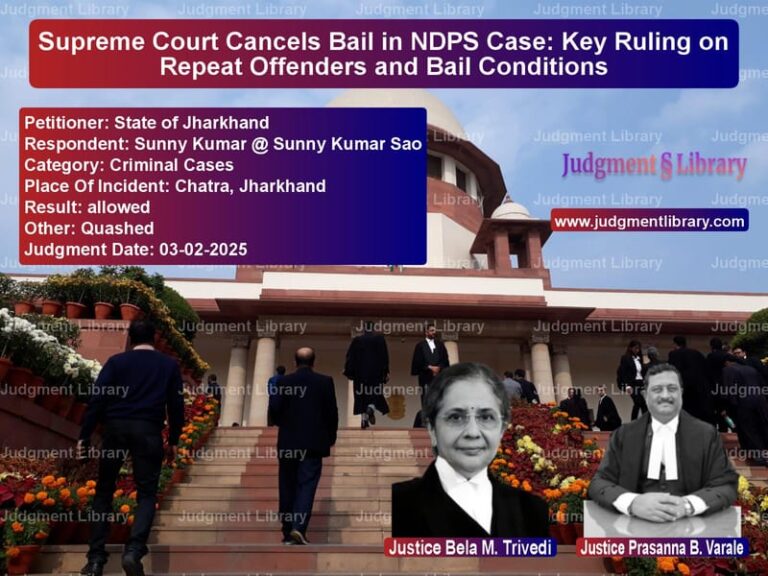State of Madhya Pradesh vs Sadique: Supreme Court Dismisses Review Petition on Default Bail
The Supreme Court of India, in its judgment dated March 15, 2022, ruled on the review petition filed by the State of Madhya Pradesh against the grant of default bail to the respondents, including Sadique. The Court dismissed the review petition, reaffirming its earlier stance on the legal principles governing the extension of time for completing investigations under the Unlawful Activities (Prevention) Act, 1967 (UAPA).
This case primarily revolved around whether a Magistrate has the authority to extend the time for investigation under UAPA, or whether such powers exclusively rest with the “Court” as defined under Section 43-D(b) of UAPA. The Supreme Court had previously ruled in favor of the respondents, granting them default bail based on procedural lapses by the prosecution.
Background of the Case
The respondents in the case were charged under the Unlawful Activities (Prevention) Act, 1967, a stringent anti-terror law in India. As per the provisions of UAPA, the investigating agency is required to complete the investigation within a specified period, failing which the accused becomes entitled to default bail under Section 167(2) of the Code of Criminal Procedure (CrPC).
However, in this case, the investigating agency sought an extension of time to complete the investigation. The extension was granted by a Magistrate, and the accused were subsequently denied bail. The matter was challenged in the Supreme Court, where the accused contended that only a “Court” as defined under UAPA—not a Magistrate—has the power to grant an extension.
Petitioner’s Arguments (State of Madhya Pradesh)
The state government, while seeking a review of the earlier judgment, argued:
- The extension of time was properly granted by a Magistrate, and the accused should not have been granted default bail.
- The accused were charged under UAPA, which necessitated a stricter interpretation of procedural safeguards.
- The prosecution required additional time to complete the investigation due to the complexity of the case.
Respondent’s Arguments (Sadique & Others)
The respondents, on the other hand, contended:
- The Magistrate did not have the legal authority to extend the investigation period under UAPA.
- The accused were entitled to default bail as per the ruling in Bikramjit Singh vs. State of Punjab (2020) 10 SCC 616.
- The prosecution had failed to adhere to procedural requirements, and their failure to obtain an extension from a competent authority could not be overlooked.
Supreme Court’s Observations
The Supreme Court, comprising Justices Uday Umesh Lalit, S. Ravindra Bhat, and Bela M. Trivedi, relied on its earlier decision in Bikramjit Singh vs. State of Punjab, where it was held that:
“Consequently, insofar as ‘Extension of time to complete investigation’ is concerned, the Magistrate would not be competent to consider the request, and the only competent authority to consider such request would be ‘the Court’ as specified in the proviso in Section 43-D(b) of the UAPA.”
Read also: https://judgmentlibrary.com/criminal-limitation-period-supreme-court-clarifies-computation-of-time/
Given this legal precedent, the Supreme Court reaffirmed that the respondents were rightly entitled to default bail.
Final Verdict
The Supreme Court ruled:
“The grounds taken in the Review Petition do not make out any error apparent on record to justify interference. This Review Petition is, therefore, dismissed.”
Implications of the Judgment
This ruling reinforces crucial legal principles:
- Only a Court, not a Magistrate, can extend the investigation period under UAPA.
- Any procedural lapses by the prosecution can lead to the accused obtaining default bail.
- The Supreme Court does not entertain review petitions unless there is a clear error apparent on record.
Conclusion
The Supreme Court’s ruling in State of Madhya Pradesh vs. Sadique upholds the rights of the accused under UAPA and reinforces the necessity for strict adherence to procedural requirements. This judgment ensures that investigating agencies do not misuse their powers and that accused persons are not unlawfully detained due to procedural lapses.
Petitioner Name: State of Madhya Pradesh.Respondent Name: Sadique & Others.Judgment By: Justice Uday Umesh Lalit, Justice S. Ravindra Bhat, Justice Bela M. Trivedi.Place Of Incident: Madhya Pradesh.Judgment Date: 15-03-2022.
Don’t miss out on the full details! Download the complete judgment in PDF format below and gain valuable insights instantly!
Download Judgment: state-of-madhya-prad-vs-sadique-&-others-supreme-court-of-india-judgment-dated-15-03-2022.pdf
Directly Download Judgment: Directly download this Judgment
See all petitions in Bail and Anticipatory Bail
See all petitions in Terrorist Activities
See all petitions in Judgment by Uday Umesh Lalit
See all petitions in Judgment by S Ravindra Bhat
See all petitions in Judgment by Bela M. Trivedi
See all petitions in dismissed
See all petitions in supreme court of India judgments March 2022
See all petitions in 2022 judgments
See all posts in Criminal Cases Category
See all allowed petitions in Criminal Cases Category
See all Dismissed petitions in Criminal Cases Category
See all partially allowed petitions in Criminal Cases Category







